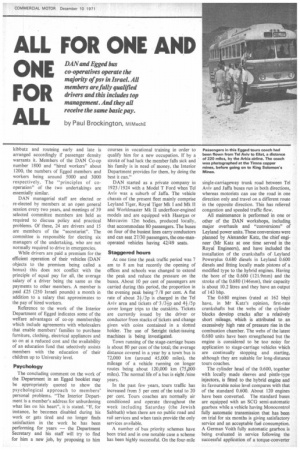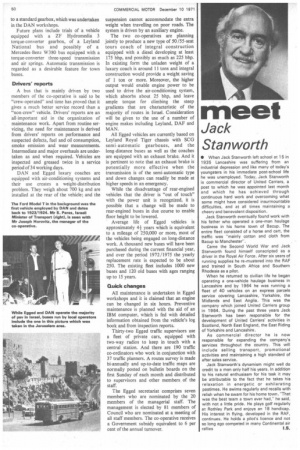ALL ONE FOR ALL FOR ONE AND
Page 51

Page 52

If you've noticed an error in this article please click here to report it so we can fix it.
by Paul Brockington, MIMechE
kibbutz and routeing early and late is arranged accordingly if passenger density warrants it. Members of the DAN Co-op number 1800 and "hired workers" about 1200, the numbers of Egged members and workers being around 5000 and 3000 respectively. The "principles of cooperation" of the two undertakings are essentially similar.
DAN managerial staff are elected or re-elected by members at an open general session every two years, and meetings of 39 selected committee members are held as required to discuss policy and practical problems. Of these, 24 are drivers and 15 are members of the "secretariat". The committee is responsible for electing six managers of the undertaking, who are not normally required to drive in emergencies.
While drivers are paid a premium for the efficient operation of their vehicles (DAN objects to the premium being called a bonus) this does not conflict with the principle of equal pay for all, the average salary of a driver being the same as the payments to other members. A member is paid £25 (250 Israeli pounds) a month in addition to a salary that approximates to the pay of hired workers.
Reference to the work of the Interior Department of Egged indicates some of the welfare advantages of co-op membership which include agreements with wholesalers that enable members' families to purchase furniture, clothing, electrical appliances and so on at a reduced cost and the availability of an education fund that selectively assists members with •the education of their children up to University level.
Psychology
The concluding comment on the work of the Department in an Egged booklet may be appropriately quoted to show the psychological approach to members' personal problems. "The Interior Department is a member's address for unburdening what lies on his heart", it is stated. "If, for instance, he becomes disabled during his work or gets tired and no longer finds satisfaction in the work he has been performing for years — the Department Secretary and his staff will try to find for him a new job, by proposing to him courses in vocational training in order to qualify him for a new occupation. If by a stroke of bad luck the member falls sick and his family is in need of money. the Interior Department provides for them, by doing the best it can."
DAN started as a private company in 1923 /1924 with a Model T Ford when Tel Aviv was a suburb of Jaffa. The vehicle chassis of the present fleet mainly comprise Leyland Tiger, Royal Tiger Mk I and Mk 11 and Worldmaster Mk II undcrfloor-engined models and are equipped with Haargas or Mercavim 12m bodies, produced locally, that accommodate 80 passengers. The buses on four of the busiest lines carry conductors and can seat 27/30 passengers, the one-manoperated vehicles having 42/49 seats.
Staggered hours
At one time the peak traffic period was 7 am to 8 am but recently the opening of offices and schools was changed to extend the peak and reduce the pressure on the buses. About 10 per cent of passengers are carried during this period, the proportion in the evening peak being-7 /8 per cent. A flat rate of about 2+/3p is charged in the Tel Aviv area and tickets of-3 /3+p and 44./5p cover longer trips to the outskirts. Tickets are currently issued by the driver or conductor from stacks of tickets and change given with coins contained in a slotted holder. The use of Setright ticket-issuing machines is being investigated.
Town running of the stage-carriage buses is about 80 per cent of the total; the average distance covered in a year by a town bus is 72,000 km (around 45,000 miles), the mileage of a vehicle running on longer routes being about 120,000 km (75,000 miles). The normal life of a bus is eight /nine years.
In the past few years, tours traffic has increased from 5 per cent of the total to 20 per cent. Tours coaches are normally air conditioned and operate throughout the week including Saturday (the Jewish Sabbath) when there are no public road and rail services and when taxis provide the only services available.
A number of bus priority schemes have been tried and in one notable case a scheme has been highly successful. On the four-mile single-carriageway trunk road between Tel Aviv and Jaffa buses run in both directions, whereas motorists can use the road in one direction only and travel on a different route in the opposite direction. This has relieved congestion and speeded traffic flow.
All maintenance is performed in one or other of the DAN workshops, including major overhauls and "conversions" of Leyland power units. These conversions were planned by Alexander Katz, the chief engineer (Mr Katz at one time served in the Royal Engineers), and have included the installation of the crankshafts of Leyland Powerplus 0.680 diesels in Leyland 0.600 diesels and fitting locally made pistons of a modified type to the hybrid engines. Having the bore of the 0.600 (121.9mm) and the stroke of the 0.680 (146mm), their capacity is about 10.2 litres and they have an output of 143 bhp.
The 0.680 engines (rated at 162 bhp) have, in Mr Katz's opinion, first-rate crankshafts but the webs of the cylinder blocks develop cracks after a relatively short mileage, which is attributed to an excessively high rate of pressure rise in the combustion chamber. The webs of the latest 0.680 units have been strengthened but the engine is considered to be too noisy for application to stage-carriage vehicles which are continually stopping and starting, although they are suitable for long-distance tours coaches.
The cylinder head of the 0.600, together with locally made sleeves and pintle-type injectors, is fitted to the hybrid engine and its favourable noise level compares with that of the standard 0.600. About 120 engines have been converted. The standard buses are equipped with an SCG semi-automatic gearbox while a vehicle having Monocontrol fully automatic transmission that has been on trial for six months is giving satisfactory service and an acceptable fuel consumption. A German Voith fully automatic gearbox is being evaluated in service following the successful application of a torque-converter to a standard gearbox, which was undertaken in the DAN workshops.
Future plans include trials of a vehicle equipped with a ZF Hydromedia 3 torque-converter gearbox, of a Leyland National bus and possibly of a Mercedes Benz W380 bus equipped with a torque-converter three-speed transmission and air springs. Automatic transmission is regarded as a desirable feature for town buses.
Drivers' reports A bus that is mainly driven by two members of the co-operative is said to be "crew-operatedand time has proved that it gives a much better service record than a "non-crew" vehicle. Drivers' reports are an all-important aid in the organization of maintenance work. Apart from routine servicing, the need for maintenance is derived from drivers' reports on performance and suspected defects, fuel and oil consumption, smoke emission and wear measurements. Intermediate and major overhauls are undertaken as and when required. Vehicles are inspected and greased twice in a service period of 34 working days.
DAN and Egged luxury coaches are equipped with air-conditioning systems and their use creates a weight-distribution problem. They weigh about 700 kg and are installed at the rear of the vehicle; and the suspension cannot accommodate the extra weight when travelling on poor roads. The system is driven by an auxiliary engine.
The two co-operatives are planning jointly to produce a new type of 50 /55-seat tours coach of integral construction equipped with a diesel developing at least 175 bhp, and possibly as much as 225 bhp. In existing form the unladen weight of a luxury coach is around 11 tons and integral construction would provide a weight saving of I ton or more. Moreover, the higher output would enable engine power to be used to drive the air-conditioning system, which absorbs about 25 bhp, and leave ample torque for climbing the steep gradients that are characteristic of the majority of routes in Israel. Consideration will be given to the use of a number of engine makes including Leyland. DAF and MAN.
All Egged vehicles are currently based on Leyland Royal Tiger chassis with SCG semi-automatic gearboxes, and the long-distance buses as well as the coaches are equipped with an exhaust brake. And it is pertinent to note that an exhaust brake is potentially more effective when the transmission is of the semi-automatic type and down changes can readily be made at higher speeds in an emergency.
While the disadvantage of rear-engined vehicles that the driver is "out of touch" with the power unit is recognized. it is possible that a change will be made to rear-engined buses in due course to enable floor height to be lowered.
Average life of Egged vehicles is approximately 4+ years which is equivalent to a mileage of 250,000 or more, most of the vehicles being engaged on long-distance work. A thousand new buses will have been purchased during the current financial year, and over the period 1972/1975 the yearly replacement rate is expected to be about 250. The existing fleet includes 1000 new buses and 120 old buses with ages ranging up to 15 years.
Quick changes
All maintenance is undertaken in Egged workshops and it is claimed that an engine can be changed in six hours. Preventive maintenance is planned with the aid of an IBM computer, which is fed with detailed information obtained from the vehicle's log book and from inspection reports.
Thirty-two Egged traffic supervisors use a fleet of private cars, equipped with two-way radios to keep in touch with a central station. And there are 190 traffic co-ordinators who work in conjunction with 37 traffic planners. A routes survey is made bi-annually and up-to-date traffic maps are normally posted on bulletin boards on the first Sunday of each month and distributed to supervisors and other members of the staff.
The Egged secretariat comprises seven members who are nominated by the 20 members of the managerial staff. The management is elected by 81 members of Council who are nominated at a meeting of all staff members. The co operative receives a Government subsidy equivalent to 6 per cent of the annual turnover.




































































































